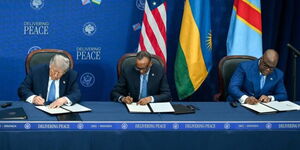Mercy Kimani started out as a street vendor, a venture she hoped would be the beginning of her journey to financial freedom.
Through her persistence, vision and drive, her dreams finally came true and she was able to expand her business and set her foot into the world of manufacturing.
Now she runs a factory where she has employed over 200 people and running raking a turnover of over Kshs 250 Million a year.
Her story is replicated by Oyie Fabrications which went from an informal business to a licensed enterprise employing 38 full-time staff.
The business is looking forward to opening branches all over the country so that they can hire more people.
Similarly, Mofarm an exporter of fresh fruits and vegetables to foreign lands had to meet some conditions set by the Europe market.
The clients in Europe required that they have a grading machine which was expensive and financing to purchase the equipment became their biggest challenge - they eventually overcame it.
The three businesses form part of the over 9 Million micro, small and medium enterprises (MSMEs) which make up to 90% of Kenya's private sector in spite of an 18 Billion credit shortfall.
The MSMEs are the bedrock of wealth creation in Kenya as they account for over 90 percent of Kenya’s private sector, employing over 15 Million Kenyans in both the 1.7 Million registered and 7 million unregistered businesses.
In order for the businesses to grow and transit from micro to small and small to medium, there is a need for increased savings and reinvestment by plowing back the income.
What’s more, the financial support to expand their operations is a great deterrent where most businesses opt for self-funding which is extremely limiting especially if liquidity is a factor.
It is with this quagmire in mind, that Co-op bank embarked on a mission to offer financing solutions to thousands of small businesses in Kenya.
So far, the institution had made available a Kshs15.2 Billion kitty.
Traders can access unsecured business loans, a first of its kind in Kenya, E-Credit through their MCo-opCash App where businesses are able to borrow up to Ksh2 Million via their mobile phone, packaged insurance cover which are handpicked and specifically negotiated to suit various segments under MSME, revised and pre-approved limits on overdrafts and loans.
It is with this facility that Mercy was able to secure funding to expand her business.
“I'm most proud of this factory, It was my dream to go into manufacturing. Co-op bank is like my home, getting a loan is easy because they understand the nature of my business,” she is elated to state.
Similarly, with the funding from the bank, Mofarm was empowered to meet the demand and export five containers of locally grown organic avocados to Europe and the Middle East every week.
“We are able to support more people in our country to get employment and feed their families.”
A 2016 KNBS survey noted that in the MSME sector a majority of the business owners were adopting self-sponsored training indicating that business owners were aware of their skills’ deficits and they sought training to improve their entrepreneurial competencies.
Coop bank recently rolled out a countrywide campaign in all counties, to reach out to the traders in the grassroots.
The forums focus on training and equipping business clients with the skills and strategies to grow their businesses in the changing operating environment in the economy.
MSMEs are an integral part of Kenya’s economy playing a prolific role in employment creation, income generation and consequently poverty reduction.
Most importantly, these facilities geared towards supporting them are in line with the country’s vision 2030, The Big Four Agenda and globally achieving the Sustainable Development Goals.
Here is the video:












